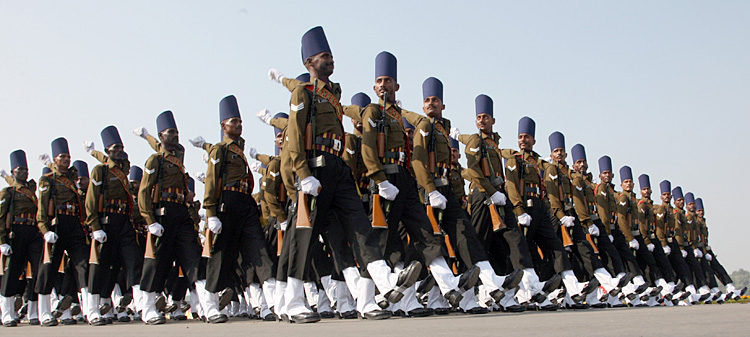INDIAN ARMED FORCES CHIEFS ON
OUR RELENTLESS AND FOCUSED PUBLISHING EFFORTS

SP Guide Publications puts forth a well compiled articulation of issues, pursuits and accomplishments of the Indian Army, over the years

I am confident that SP Guide Publications would continue to inform, inspire and influence.

My compliments to SP Guide Publications for informative and credible reportage on contemporary aerospace issues over the past six decades.
- Interim Defence Budget 2024-25 — An Analysis
- Union Defence budget 2024
- Indian Army: In quest of greater firepower and policy recommendations for gaps
- Indian Army Annual Press Conference 2024
- 6G will transform military-industrial applications
- Tata Boeing Aerospace Delivers 250 AH-64 Apache Fuselages, Manufactured in India
Over 300 Army-men Knock on SC Door
 |
By Lt. General P.C. Katoch (Retd) Former Director General of Information Systems, Indian Army |

In an unprecedented move over 300 serving Army-men, in personal capacity, moved a writ petition to the Supreme Court on 14 August 2018 over their fundamental rights, asking whether a soldier's discretion can be put under legal scrutiny. It may be recalled that in J&K, an FIR had been filed by the police under sections 302 (murder) and 307 (attempt to murder) of the IPC against Major Aditya and his unit of the 10 Garhwal Rifles over the Shopian Firing incident of January 27 this year when three civilians were killed after Army personnel fired at a stone-pelting 200-strong mob of protestors in J&K's Shopian district. The Army was forced to fire in self defence after the marauding mob injured Army personnel, tried to lynch a Junior Commissioned officer and set fire to Army vehicles. In the writ petition filed on 14 August 2017, which has been admitted by the SC, the officers are raises a number of questions, among which are, 'Can the discretion of a soldier be put under legal scrutiny?' and 'Can anything be above national security?' The issues raised are: whether the rights of a soldier has been violated in the probe, given the trying circumstances under which the officers serve in their aim to curb militancy and terrorism in order to protect the interests of the country; whether members of an institution with a glorious history of martyrdom and sacrifice should serve under the threat of being tried under court martial if they don't follow orders and prosecuted by the criminal justice system if they do; whether anything can be put above national security; won't this affect their morale; whether the court applying a murder charge even while the investigations were ongoing is right, and; whether it would prejudice agencies in the matter. Significantly, the Supreme Court is currently hearing the plea of Major Aditya's father, Lt Col Karamveer Singh, seeking to quash the FIR against his son. Lt Col Singh had said in his petition that Major Aditya was "wrongly and arbitrarily" named in the FIR as the incident relates to an Army convoy that was on bonafide military duty in an area under AFSPA. It is actually a blot on the nation that serving Army men have to approach the SC on such an issue.
Ironically, media had reported that before filing an FIR against Major Aditya for the Shopian incident on January 27, Mehbooba Mufti, then Chief Minister of J&K had spoken to Defence Minister Nirmala Sitharaman, and latter had acceded to Mehbooba's proposal of filing the FIR. This reflects poorly on the Defence Minister, and equally on Army Chief Bipin Rawat that serving Army personnel have to approach the SC against unwarranted and arbitrary dilution of the Armed Forces Special Powers Act (AFSPA). Any Chief has the fundamental right to approach a constitutional court when he feels right to do so. If one Army Chief approached the SC for his date of birth, why couldn't the present Chief approach the SC against dilution of AFSPA if the political authority looked the other way? And all this is happening concurrent to MoS (Defence) telling Parliament that the Army has deficiency of over 9000 officers; 7,986 in Indian Army and 1,256 in the Navy as of January 2018. AFSPA provides extraordinary powers of force to soldiers deployed in disturbed areas, neither the Army called for AFSPA nor drafted this Act. Instead, this was discussed and debated by various Parliaments and passed to ensure that the Army can function effectively in the designated disturbed area, when deployed.
But it must be noted that the deployment of Army in the hinterland and application of AFSPA comes only 'after' the said area is declared disturbed under the 'Disturbed Area Act'. An area is declared 'disturbed' when the state machinery is unable to function and calls in the Army for support. Therefore, any dilution of AFSPA then would mean diluted effectiveness of the Army in counter insurgency or counter terrorism and personnel getting involved in litigation consistently. A Disturbed Area Act passed on September 11, 1958 was applied to the seven northeast states. A similar act passed in 1983 was applied to Punjab and Chandigarh, which was withdrawn in 1997. A similar act was applied to J&K in 1990 and has been in force since. Neither does the Army ask for deployment in the hinterland, nor does it enjoy when forced to act against its own Indian brethren when deployed in disturbed areas – its primary task being against the enemy and defending the borders. As importantly in an insurgency environment, the Army can only keep violence levels at manageable levels whereas the balance must be taken on by the state administration. Hopefully, the SC bench dealing with the writ petition will bear these facts in mind.





